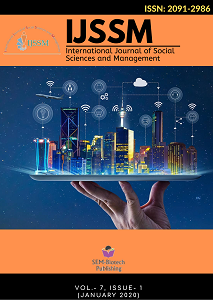Critical Factors of Emotional Intelligence and Its Effect on Leadership Qualities at Workplace: A Success Mantra for Effective Leaders
DOI:
https://doi.org/10.3126/ijssm.v7i1.27404Keywords:
EI Factors, Leadership Qualities, Self-Confidence, Self-Control, Organisational SuccessAbstract
At the heart of all outstanding organizations is a culture that promotes productivity and quality by valuing and creating high trust relationships. Sound business practices are essential to success, but without trusting relationships that are forged each day at all levels, organizations are limited and distracted by events and symptoms that dampen morale and discourage performance. Regardless of how sound the business practices are, the business will be limited in growth and long-term profit if strategies for integrating and valuing all people are not a part of the plan. To achieve this cultural mindset where all members of the workforce feel valued requires effort, strategy and commitment the need is for the organisations to have leaders with high emotional intelligence. Emotional intelligence has become a popular topic in the business press in recent years. Although the importance of the term “emotional intelligence” is of recent origin it has helped develop competencies that are required in many leaders. Emotional Intelligence has become a vital part of how today's leaders meet the significant challenges they face. Emotional intelligence is defined as a person’s self-awareness, self-confidence, self-control, commitment and integrity, and a person’s ability to communicate, influence, initiate change and accept change. Emotional Intelligence can help leaders in an ever more difficult leadership role, one that fewer and fewer people seem capable of fulfilling. And in the middle of the "Talent War", especially at the highest levels in organisations, emotional intelligence can give developing leaders a competitive edge. The idea that success in both life and in work -at least where managing people is a significant factor becomes highly credible so organisations have recognized how their best leaders and managers need to develop their understanding of themselves and others.
Int. J. Soc. Sc. Manage. 7(1): 12-16.
Downloads
Downloads
Published
How to Cite
Issue
Section
License
This license enables reusers to distribute, remix, adapt, and build upon the material in any medium or format for noncommercial purposes only, and only so long as attribution is given to the creator.




